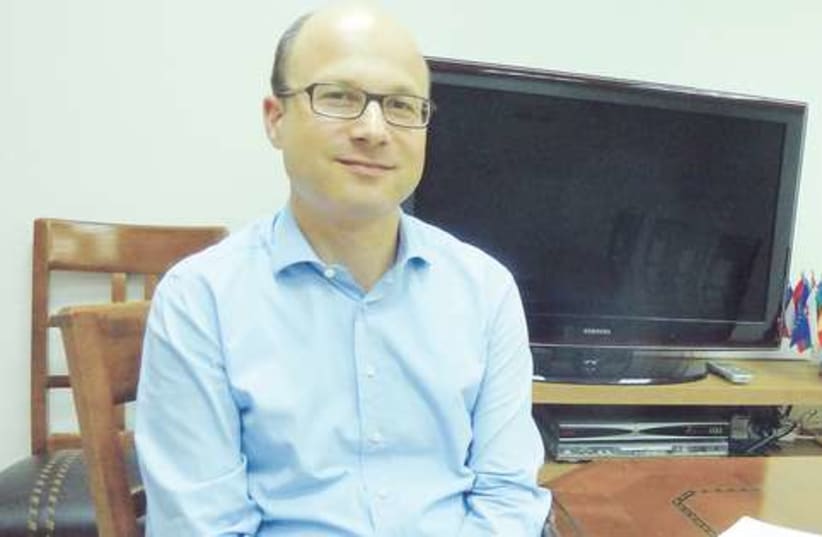Why is this program so important? The EU has a number of programs [it finances], but it has one very large research program called the Framework Program, which operates on seven-year cycles with a budget of seven billion euros. Israel has been associated with that program since 1996. We recently celebrated what might be called the bar mitzva of Israel’s involvement in 2010 at the Bloomfield Museum in Jerusalem with President Shimon Peres and members of the scientific community.What does it mean that Israel is an associate member of the program? Israel pays into the program and, in return, Israeli scientists, research centers and universities can participate in this program like a member state. Israel is the only non-European country that has this associate status. This is an indication of the EU’s interest in working closely with Israel in the area of research and development.
How much does Israel pay to be involved? It pays about 1 percent of the program – about 450 million euros over seven years (2007-2013) [participation is based on the size of Israel’s GDP compared to that of the EU]. And in return, it can participate in all the projects that are funded by the program. The way it works is that, for instance, the EU publishes calls for projects, and then scientists work together and present proposals that are peer reviewed. Many Israeli experts participate in this peer review as well. The projects are selected and then funded.Israel is doing very well in the Framework Program; we are happy with the level of cooperation. Israel is particularly active in basic and fundamental science and ICT [information and computer technology], which reflects its level of hi-tech. And fundamental science reflects a high level of basic science in places like the Weizmann Institute.What changes have you seen since Israel was first associated with the work in 1996? First of all, there is more participation by Israel. These projects consist of up to 10 to 15 partners. What you see is that there are more Israeli coordinators than in the past, and that shows this relationship is maturing.What are the actual figures in terms of participation? Israel participates in 838 funded projects, which I think is about 2% of the total number of projects. [According to the FP website there are 12,094 projects, which means that Israel participates in 6% of the projects.] Can you highlight a few of these projects? One is an intensive nanotechnology development at the University of Haifa that develops a nano nose to detect lung cancer at an early stage. Another one that has been going on for a few years is the researchers’ night, an evening dedicated promoting science, geared towards young people. They do this at science museums and events to popularize science, from Kiryat Shmona to Jerusalem. Science is good for competitiveness and the economy. You need a stable flow of people into science, and this means getting people interested in it at an early age.
Are these events funded completely by the EU? Usually the EU covers about half of the cost of the project. The other half is covered by local government or private enterprise.Is it mostly private companies or universities that participate in Israel? The majority is academia, but you have sizable participation by industry. As you know, a lot of the research in Israel is done by industry, which is not the case in Europe. In Israel, about 70% of research is done by industry. You also now see more and more Israeli colleges participating, which means that their level is increasing. It is a very competitive program, so it is hard to get through.That means the level of research at the colleges is very good. [In the past in Israel, only the universities were considered to be producing first-class research; the creation of numerous colleges is a recent phenomenon, and the perception is that their level of education is much lower than at the main universities.]
Are there other highlights? There are quite a few projects that have other participants from the region. You have cooperation between Israel and Mediterranean countries, such as Egypt, Morocco, Jordan and the Palestinians. It is an instrument to foster cooperation among scientists. In the regional dimension, there is something authorized for 2020, the project to de-pollute the Mediterranean, and Israel is quite active there. I wanted to highlight that because the work we do with Israel is quite intensive, but there is also the regional aspect and Israel has been a very regular participant in Euro-Mediterranean dialogue in energy and telecom.Do you regret that there isn’t more concentration on these cooperative aspects? I’m leaving this post soon, and I have to say that I’m not sure that science can compete with the big diplomatic issues, but we have gotten exposure and we invite the media to our science events.The diversity of the projects funded under the Framework Program is quite extraordinary.There is a wide range of diverse projects funded under the Framework Program. One project at Tel Aviv University was funded to the tune of 87,000 euros for a researcher to examine and publish on the philosophy of Yagacara Buddhism in the fourth century.A researcher at Bar-Ilan University is coordinating a project to examine the effects of the brain drain in Europe. Tel Aviv University is participating in a three-million-euro project aimed at examining how viruses infect cells.Three Israeli companies partnered with a Spanish university on a project dealing with water sustainability. Israel is particularly active in the security sector of projects, participating in 23% of them. Those projects include companies that specialize in optical and surveillance technologies, such as Azimuth technologies and Israel Aerospace Industries.
